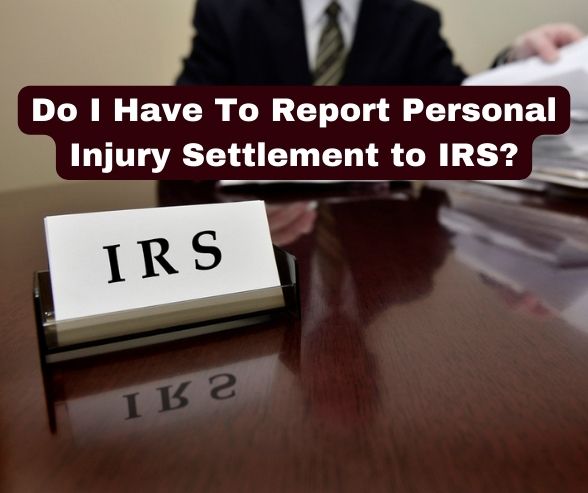Personal injury settlements can be a lifeline for individuals who have suffered physical, emotional, or financial damages due to accidents, negligence, or intentional harm. When it comes to tax implications, many recipients wonder, “Do I have to report personal injury settlement to the IRS?” Understanding the taxation rules surrounding personal injury settlements is crucial to avoid unexpected financial complications. In this article, we will explore the nuances of reporting personal injury settlements to the IRS and how you can navigate the tax landscape.
How Are Personal Injury Settlements Taxed?
Does Injury Settlement Count As Income?
 Personal injury settlements can encompass various types of compensation, including medical expenses, lost wages, pain and suffering, and punitive damages. Whether these settlements are taxable depends on the nature of the damages awarded and the specifics of the case. Here’s a breakdown:
Personal injury settlements can encompass various types of compensation, including medical expenses, lost wages, pain and suffering, and punitive damages. Whether these settlements are taxable depends on the nature of the damages awarded and the specifics of the case. Here’s a breakdown:
When are Personal Injury Settlements Non-Taxable?
- Physical Injuries or Sickness: If your settlement is awarded for physical injuries or sickness, the amount received is generally non-taxable. This includes compensation for medical expenses and pain and suffering related to the injury.
- Emotional Distress: Emotional distress settlements are non-taxable if they stem from a physical injury or illness. However, emotional distress settlements without a physical component are taxable.
- Compensatory Damages: Damages received to compensate for actual losses, such as medical bills or property damage, are typically non-taxable.
When are Personal Injury Settlements Taxed?
- Punitive Damages: Punitive damages, awarded to punish the defendant for intentional misconduct or gross negligence, are taxable and should be reported as income.
- Interest on Settlement: If the settlement includes interest, the interest portion is generally taxable income.
- Lost Wages: If your settlement compensates for lost wages, these are considered taxable income as they would have been subject to income tax if you had received them through employment.
How Much Does the IRS Tax Personal Injury Settlements?
Is Personal Injury Settlement Taxable In Texas?
Determining the IRS tax implications on personal injury settlements can be a complex and nuanced process. In general, the IRS does not consider compensation for personal physical injuries or sickness as taxable income. This means that if you receive a settlement or award as a result of a personal injury lawsuit that is meant to compensate you for medical expenses, pain and suffering, or emotional distress caused by a physical injury, it is typically not subject to federal income tax.
However, there are exceptions to this rule. If a portion of your settlement is allocated for punitive damages, interest, or compensation for non-physical injuries like defamation or employment discrimination, these amounts may be taxable. It’s crucial to carefully review the terms of your settlement to determine which components might be taxable and which are not, as proper documentation and classification can significantly impact your tax obligations.
Additionally, it’s important to note that the tax treatment of personal injury settlements can vary at the state level. Some states may follow federal guidelines and exclude compensation for physical injuries from state income tax, while others might have different rules. It’s advisable to consult with a tax professional or attorney who specializes in personal injury settlements to navigate the specific tax implications based on your jurisdiction and the nature of your settlement. Being well-informed about the tax aspects of your personal injury settlement can help you accurately report your income to the IRS and prevent any potential issues with tax compliance in the future.
How to Protect Your Settlement from Garnishment
Protecting your settlement from garnishment requires proactive steps and a clear understanding of your legal rights. First and foremost, it’s crucial to consult with a knowledgeable attorney specializing in settlement laws. They can guide you through the complexities of the legal system and help you explore your options. Additionally, consider placing your settlement funds in an account that is exempt from garnishment, such as a qualified retirement account or a trust fund. Keeping your settlement funds separate from your regular banking accounts can also offer a layer of protection.
Document all aspects of your settlement, including the source of funds and their intended use, as proper documentation can support your case if a creditor attempts to garnish your settlement. Stay informed about your rights and responsibilities, and be proactive in addressing any outstanding debts to prevent garnishment attempts. Being vigilant and seeking professional legal advice are key steps in safeguarding your settlement from garnishment.
- Establish a Special Needs Trust: If you or a loved one receiving the settlement has disabilities, setting up a special needs trust can safeguard the funds while still allowing the individual to qualify for government assistance programs.
- Negotiate Settlement Terms: Work with your attorney to negotiate settlement terms that protect your funds from creditors and garnishments. Structuring the settlement in specific ways can make it less vulnerable to seizure.
- Pay Off Debts: Using a portion of your settlement to pay off existing debts can prevent creditors from pursuing legal action to collect the debts, thus protecting your funds from garnishment.
Consulting With A Lawyer
Contacting a lawyer about your personal injury settlement and taxes is crucial to ensure you fully understand the tax implications of the settlement amount you receive. An experienced attorney can provide expert guidance tailored to your specific situation, helping you navigate complex tax laws and potentially saving you from unexpected financial consequences in the future.
- Legal Expertise: A lawyer experienced in personal injury law and taxation can provide valuable insights tailored to your specific situation.
- Tax Planning: A knowledgeable attorney can help you structure your settlement to minimize tax liability, ensuring you retain as much of the settlement as possible.
- Understanding Local Laws: Laws regarding taxation of settlements can vary by state and country. A local attorney will be well-versed in the specific regulations applicable to your case.
In conclusion, understanding the tax implications of personal injury settlements is crucial to avoid financial surprises. While many aspects of personal injury settlements are non-taxable, certain elements, such as punitive damages and interest, can be subject to taxation. Protecting your settlement from garnishment and consulting with a lawyer are essential steps to ensure you retain the maximum amount of your settlement. By being informed and seeking professional advice, you can navigate the taxation of personal injury settlements with confidence and financial security.
